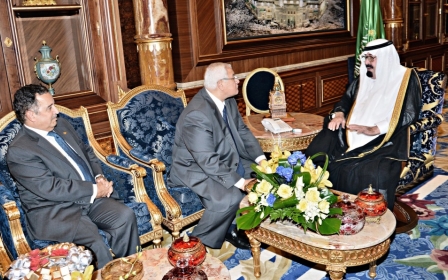Saudi Arabia seeks stronger US-Gulf cooperation

The Crown Prince of Saudi Arabia called for stronger military cooperation between the United States and the Arab monarchies of the Gulf, whose security he says is under threat, at the opening session of the first joint defence ministers conference of the Gulf Cooperation Council (GCC) in Jeddah on Wednesday.
“We meet today amid persistent threats to the region’s security and stability”, which “necessitate coordination in politics and defence strategies of our countries,” said Salman bin Abdulaziz, Crown Prince and Defence Minister of Saudi Arabia.
“The security of our countries and our people is in danger,” he added.
The crown prince raised concerns over “political crises” in some Arab states and pointed to “attempts to acquire weapons of mass destruction and meddling of certain states” in the internal affairs of others, in an apparent reference to Iran.
US Defence Secretary Chuck Hagel attended the meeting and stressed the “historic and strategic relations” between Washington and GCC countries had “contributed to cementing security and stability in the region”.
Stay informed with MEE's newsletters
Sign up to get the latest alerts, insights and analysis, starting with Turkey Unpacked
He also called for collaboration in dealing with perceived security threats.
“The security challenges facing this region threaten the region as a whole, and no one nation can address them alone,” he said at the end of the meeting.
“We agreed on the need for more cooperation in three areas: more integrated air and missile defence coordination; closer maritime security integration; and expanded cybersecurity cooperation,” he added.
Hagel is in Saudi Arabia as part of a regional tour that will also take him to Jordan and Israel, in what is his third Middle East trip since he took office in 2003, according to a statement by the US Department of Defence.
Relations between the US and Gulf states, in particular Saudi Arabia, have appeared strained recently after the Americans decided not to deploy military strikes against President Bashar al-Assad’s regime in Syria last year.
Some analysts have played down talk of a rift and said public statements by Saudi officials expressing disappointment at US policy decisions are nothing more than an attempt to have their voice heard.
“Public statements by Saudi officials that indicate disagreements about policy issues are just reminders that the US should not ignore or side-line the kingdom,” said Christian Koch, director of the Saudi-backed Gulf Research Centre.
“With a steady stream of visitors to the kingdom, including President Obama and now Defence Secretary Hagel, it is clear that this message has been understood in Washington,” he added.
Hagel said GCC defence ministers agreed at the meeting in Jeddah that assistance to the rebels in Syria “must be carefully directed to the moderate opposition”.
Saudi Arabia has become increasingly concerned that hundreds of their citizens who have gone to fight in the Syrian civil war, often with the encouragement of prominent Saudi clerics, may return home and turn their weapons against the monarchy.
King Abdullah passed a decree in February barring citizens from fighting in conflicts outside the kingdom, imposing penalties of prison sentences between three and 20 years for anyone who violates the decree.
Saudi Arabia-Iran relations
The GCC defence ministers summit in Jeddah also provided an opportunity for Defence Secretary Hagel to allay Saudi concerns over the implications of an interim nuclear deal struck with Iran last November.
Hagel underlined a shared commitment with GCC states to prevent “Iran from obtaining a nuclear weapon and ensuring its programme is exclusively peaceful”.
While praising Tehran’s diplomatic engagement as a “positive development”, Washington and Gulf states “continue to share concerns about Iran’s destabilising activities throughout the region”, including “efforts to undermine stability in GCC member nations," Hagel said after the meeting.
Talks are ongoing over a nuclear deal with representatives from the P5+1 countries and Iranian officials meeting this week in Vienna to discuss terms on a long-term deal ahead of a 20 July deadline for an agreement to be found.
Separately, the Foreign Minister of Saudi Arabia, Prince Saud al-Faisal, said on Tuesday that he has invited his Iranian counterpart Mohammad Javad Zarif to visit Riyadh in a bid to settle differences “to the satisfaction of both countries”.
“Our hope is Iran becomes part of the effort to make the region as safe and as prosperous as possible, and not part of the problem of the insecurity of the region,” he told reporters in Riyadh.
“Any time he see fit to come, we are willing to receive him,” he added.
The Gulf Research Centre’s Christian Koch believes this is a sign of Saudi Arabia acting independently on Iran.
“It is a signal that Riyadh needs to put forward its own initiative and engage Iran outside the P5+1 framework in order to make its own assessment of where negotiations stand,” Koch said.
As the 20 July deadline approaches, if there are closer relations between Saudi Arabia and France, who have taken a harder line on a potential deal with Iran, this should be taken as discontent from the Saudis, Koch says.
“Closer Saudi-French exchanges would be an indication that Riyadh is not too happy with how Washington is pursuing the negotiations and would be a way to send messages to the Americans that they feel once again their concerns have not been taken seriously enough," he said.
Middle East Eye delivers independent and unrivalled coverage and analysis of the Middle East, North Africa and beyond. To learn more about republishing this content and the associated fees, please fill out this form. More about MEE can be found here.




